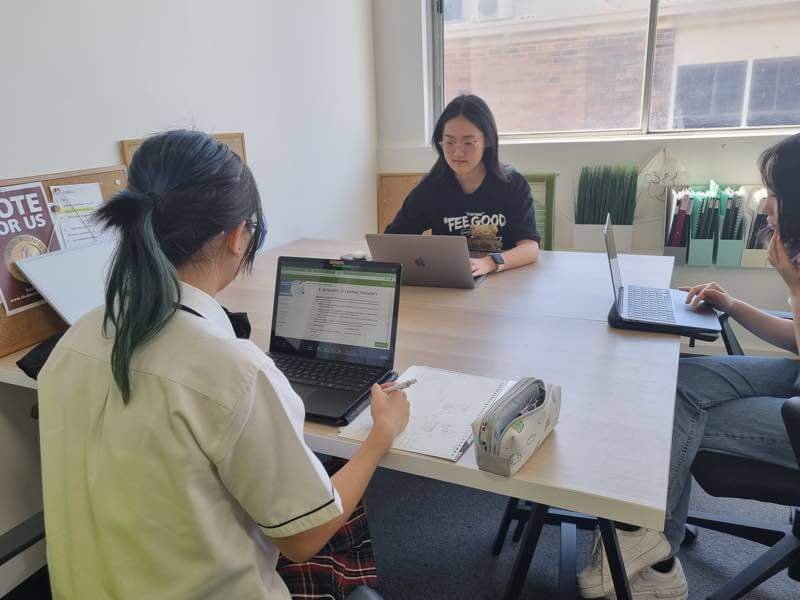
5 Study Tips for the HSC from a HSC Band 6 All Rounder

Ian
Ex-tutor & HSC Band 6 All Rounder @YK Education
- 5 min read
The single biggest challenge that students will face in the HSC is time.
Each assessment is followed by another in a seamless transition, all the while extra-curricular activities run in the background. During the HSC, I was acutely aware of these time constraints because of my duties as a prefect, cadet under officer, and as part of my school’s 4x100m relay team. The early mornings, meetings during lunch and Friday after school commitments certainly stacked up and at times were extremely tiring. Inevitably, at some point, you will fall behind in school work.
Therefore, I implemented these 5 tips and strategies which I thoroughly recommend each student takes on to both catch-up and stay ahead!
Also Read: How to study for your HSC this Autumn School Holidays
Firstly, what is a band 6 and a HSC all-rounder?
A band 6 is a mark between 90-100 for an HSC non-extension subject. For the extension subjects the equivalent would be an E4, a mark between 45-50. An all-rounder is a student that has achieved either a band 6 or E4 in 10 or more units of courses in their current study.
Now, let’s dive into the five tips and strategies I used to achieve band 6 all-rounder.
Tip 1: Treat Year 11 seriously
Although Year 11 has no direct impact on your ATAR, the content taught in Year 11 is crucial in understanding Year 12 topics. Think of Year 11 as a year you can test certain studying habits and techniques. Don’t stress if things don’t
go your way because the preliminary course is the year of trial and error!
Some students who enrolled in YK Education from Year 12 averaged 50% in year 11 but achieved band 6 in Year 12 so if you are in Year 12 and reading this, don’t give up yet! However, those students did have to work much harder so you might as well start early to prepare for the HSC year.
Tip 2: Minimise distractions during study
Distractions are the bane of any student’s attempts at studying. Continuously scrolling on social media or watching videos on YouTube may seem tempting, but it ultimately serves to lower productivity and reinforce bad studying habits.
Does your 20 minute study break somehow turn into 2 hours?
It has been proven that these distractions induce dopamine, which means that you will only want more. One video on YouTube will be followed by another, and soon you will realise you are on a study break for hours. If this happens, it is time to act and stop this habit!
Ways to deal with distractions
There’s an app for everything. Including an app that blocks your access to distracting sites you like to regularly visit. These apps are extremely helpful for studying long periods of time and will serve you well in the long run. It is important that the app allows you to easily choose the blocklist and start or schedule sessions for certain lengths of time.
An app that I personally used was SelfControl (for macs only), which offered an added feature of being unable to be undone even if it was deleted.
Another method for dealing with distractions is using effective study techniques, such as the Pomodoro technique. You may have heard of this technique before, but the Pomodoro technique is a way that encourages studying with the limited time they may have. It works by brea
king work into manageable 25 minutes, and then taking 5-minute breaks. After 4 of these intervals, you can take a longer break between 15-20 minutes.
Implementing this strategy means that you would have studied for 1 hour and 40 minutes, with a total of 20 minutes as break-time. It has been proven to be one of the most effective study techniques and is something I still regularly do today.
Tip 3: Time Management
You would have heard this before, but time management is the single most important skill that a Year 12 student must learn to do well in the HSC.
How to tackle time management with timetabling
Timetabling allows you to plan beforehand when you should be studying, having some free time, and participating in extracurricular activities. It creates a rhythm and routine that induces a sense of comfort when studying, instead of making it a chore that drags on. Try: Google calendar, Notion study templates, or simply with Google Docs.
When creating your timetable, try and link it to goals you may have. These goals do not just have to relate to academics, they could also be in your personal or extra-curricular life. Ultimately, these goals will serve as your intrinsic motivation to study and do well in all facets of your HSC year.
One of the problems students encounter is not being able to follow the planned study timetable. To ensure that the timetable is relevant, reset your timetable at the start of every week. Consider weekly commitments including birthday parties, assessment periods, music performance nights, as well as homework from school and other educational institutes.
If timetabling doesn’t work for you, try listing your tasks in a planning application like Asana with estimated completion times at the beginning of each week.
Be specific when listing these tasks like “Finish Exercise 5.3 for Maths” or “Combine school and tutor notes for Common Module text” or “Complete 2021 HSC exam”. Then insert those tasks into your allocated study slots and tick the tasks off as you complete them. This way the focus is not on the study time, but rather task completion. Who doesn’t love to tick off those completion boxes?!
Be adaptable
Life happens and things may get in your way and put you behind your study schedule! Don’t stress! As cliché as it may sound, ensure you work smarter, not harder.
During my HSC year, I fell behind in studying for an upcoming maths advanced test. With not enough time to practise entire past papers, I only practiced certain questions in the paper. The questions I chose to practice were harder, instead of easier ones. This ultimately allowed me to get exposed to curveball questions, which I benefited greatly. Being adaptable to how you study will mean that you get more out of the little time you may have.
Tip 4: How to study effectively
Consistency
Being consistent and getting into a routine with studying means that more content is retained. For maths, a good rule of thumb we have at YK Education is to always do the homework set by your teacher and your YK tutor and to start practising past papers at least 2 weeks prior to any test. This means you have enough time to be exposed to the type of questions your school has and practice harder questions.
Similarly, for English, you want to start practising essays at least 2 weeks prior to any test. Personally, I was writing at least 1 essay a day up until 5 days before the assessment. From then, I would do a quick brainstorm for a maximum of 5 minutes to a random question, focusing on a thesis, themes and quotes I would use.
As I’m sure you are thinking “how did I manage my time?” while reading this. I implemented my above timetabling tip which enabled me to cope with my commitments. While consistency may differ slightly between the subjects, what should be clear is that the effort put into each is equal, no matter if there is a certain subject you dislike.
Know your Syllabus
All HSC courses come with its own set of syllabus dot points that are the parameters of any school test and the HSC examinations. It is crucial that you understand what is required from each topic and that you are not caught off-guard. If it helps, print out the syllabus dot points so you can have them right in front of you as you study for the subject.
For English though, a good idea is to consult the rubric and ensure your quotes, themes and analysis match up with the rubric points. The rubric is used to create and mark the exam, so make sure you know how it relates to what you have studied in English back to front.
Find the rubrics and syllabi below!
HSC English Standard Rubric
HSC English Advanced Rubric
HSC Maths Syllabus
HSC Japanese Beginners Syllabus
HSC Japanese Continuers Syllabus
HSC Japanese Extension Syllabus
Help Each Other
Teaching and helping others understand content allows you to consolidate your own understanding since you need to explain concepts in a clear and concise manner.
Not only is it an extremely fun way to learn in a casual environment with your friends, but it is also grounded in the principles of the social learning theory – it is the notion that new ideas can be learned from observing others.
So next time when studying seems boring, grab a couple of friends, and start studying together for that upcoming exam! This is another reason why YK Education has included workshop lessons in its program.

Tip 5: Managing setbacks
At some point during your HSC year, you will face setbacks. It’s important to learn from these setbacks and not let them discourage you from achieving your goals.
Put it into perspective
A certain test result will not go the way you wanted it to and one way or another, you will feel sad, angry, upset or any combination of these three.
It is a completely normal reaction, and some may find it helpful to let out the disappointment. The fact is, however, that test is not the be-all and end-all.
In Year 12, I had a mod C English Advanced test which I had scored significantly lower than usual in. This was because I failed to read the question properly and did not integrate a key aspect to my story. However, I reminded myself that there are many other tests, and then the HSC itself, so it is crucial to maintain perspective. The test is one of many, and so in the words of the “All-Star” song, you’ll never know if you don’t go.
Figure out what went wrong
Once you have cleared any negative feelings surrounding the test, now is the time to channel your efforts into self-reflection. I remember asking myself after the Mod C assessment what went wrong, trying to figure out the cause/s behind the issues.
Upon seeing the feedback, I was basically kicking myself as my mistake was simply a product of being pressured under timed conditions.
This certainly correlated with my preparation, where I didn’t practise under timed conditions. However, there are numerous other questions you could ask yourself such as:
Did I study enough? Did I make silly mistakes?
While these strategies and tips worked for me, everyone is different. You can use these five tips and strategies to help you or develop your own. Find a way that works for you.
Remember the HSC is not just about achieving the top marks so don’t let it dictate your life. Go out, exercise and reward yourself occasionally with that show everyone is talking about or playing a sport you love. Good Luck!
Get more study tips
Receive monthly study tips and educational content that will help you ace your final years of High School!
Thank you!
You have successfully joined our subscriber list.
YK Education Copyright 2023


